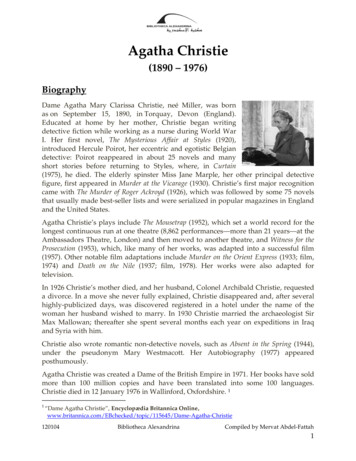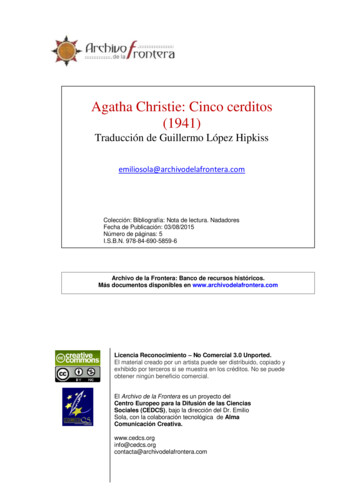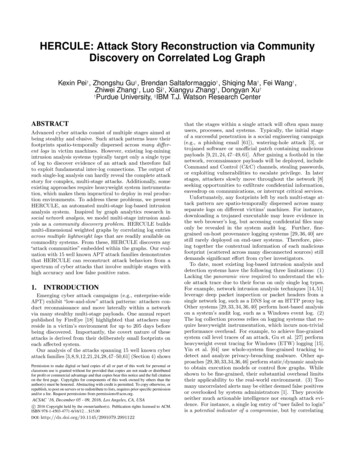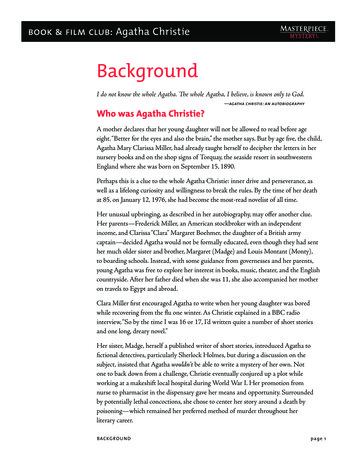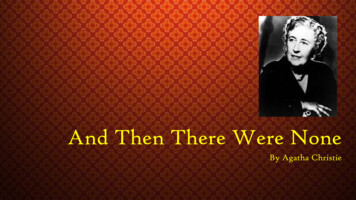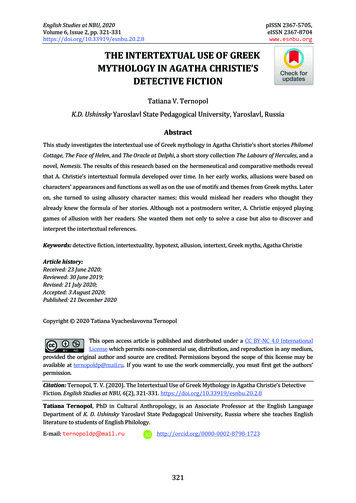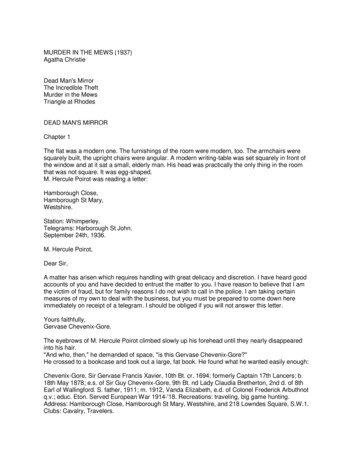
Transcription
MURDER IN THE MEWS (1937)Agatha ChristieDead Man's MirrorThe Incredible TheftMurder in the MewsTriangle at RhodesDEAD MAN'S MIRRORChapter 1The flat was a modern one. The furnishings of the room were modern, too. The armchairs weresquarely built, the upright chairs were angular. A modern writing-table was set squarely in front ofthe window and at it sat a small, elderly man. His head was practically the only thing in the roomthat was not square. It was egg-shaped.M. Hercule Poirot was reading a letter:Hamborough Close,Hamborough St Mary,Westshire.Station: Whimperley.Telegrams: Harborough St John.September 24th, 1936.M. Hercule Poirot,Dear Sir,A matter has arisen which requires handling with great delicacy and discretion. I have heard goodaccounts of you and have decided to entrust the matter to you. I have reason to believe that I amthe victim of fraud, but for family reasons I do not wish to call in the police. I am taking certainmeasures of my own to deal with the business, but you must be prepared to come down hereimmediately on receipt of a telegram. I should be obliged if you will not answer this letter.Yours faithfully,Gervase Chevenix-Gore.The eyebrows of M. Hercule Poirot climbed slowly up his forehead until they nearly disappearedinto his hair."And who, then," he demanded of space, "is this Gervase Chevenix-Gore?"He crossed to a bookcase and took out a large, fat book. He found what he wanted easily enough:Chevenix-Gore, Sir Gervase Francis Xavier, 10th Bt. cr. 1694; formerly Captain 17th Lancers; b.18th May 1878; e.s. of Sir Guy Chevenix-Gore, 9th Bt. nd Lady Claudia Bretherton, 2nd d. of 8thEarl of Wallingford. S. father, 1911; m. 1912, Vanda Elizabeth, e.d. of Colonel Frederick Arbuthnotq.v.; educ. Eton. Served European War 1914-'18. Recreations: traveling, big game hunting.Address: Hamborough Close, Hamborough St Mary, Westshire, and 218 Lowndes Square, S.W.1.Clubs: Cavalry, Travelers.
Poirot shook his head in a slightly dissatisfied manner. For a moment or two he remained lost inthought, then he went to the desk, pulled open a drawer, and took out a little pile of invitation cards.His face brightened."A La bonne heure! Exactly my affair! He will certainly be there."A Duchess greeted M. Hercule Poirot in fulsome tones:"So you could manage to come after all, M. Poirot! Why, that's splendid.""The pleasure is mine, madame," murmured Poirot, bowing.He escaped from several important and splendid beings - a famous diplomat, an equally famousactress and a well-known sporting peer - and found at last the person he had come to seek, thatinvariably "also present" guest Mr Satterthwaite.Mr Satterthwaite twittered amiably:"The dear Duchess - I always enjoy her parties. Such a personality, if you know what I mean. Isaw a lot of her in Corsica some years ago."Mr Satterthwaite's conversation was apt to be unduly burdened by mentions of his titledacquaintances. It is possible that he may sometimes have found pleasure in the company ofMessrs. Jones, Brown or Robinson but if so, he did not mention the fact. And yet, to describe MrSatterthwaite as a mere snob and leave it at that would have been to do him an injustice. He was akeen observer of human nature, and if it is true that the looker-on knows most of the game, MrSatterthwaite knew a good deal."You know, my dear fellow, it is really ages since I saw you. I always feel myself privileged to haveseen you work at close quarters in the Crow's Nest business. I feel since then that I am in theknow, so to speak. I saw Lady Mary only last week, by the way. A charming creature - potpourriand lavender!"After passing lightly on one or two scandals of the moment - the indiscretions of an Earl's daughter,and the lamentable conduct of a Viscount - Poirot succeeded in introducing the name of GervaseChevenix-Gore.Mr Satterthwaite responded immediately:"Ah! now, there is a character, if you like! The Last of the Baronets - that's his nickname,""Pardon, I do not quite comprehend -?"Mr Satterthwaite unbent indulgently to the lower comprehension of a foreigner."It's a joke, you know - a joke. Naturally, he's not really the last Baronet in England - but he doesrepresent the end of an era. The Bold Bad Baronet - the mad harum-scarum Baronet so popular inthe novels of the last century - the kind of fellow who laid impossible wagers and won 'em."He went on to expound what he meant in more detail. In younger years, Gervase Chevenix-Gorehad sailed round the world in a windjammer. He had been on an expedition to the Pole; he hadchallenged a racing peer to a duel. For a wager he had ridden his favorite mare up the staircase ofa ducal house. He had once leapt from a box to the stage, and carried off a well-known actress inthe middle of her rôle. The anecdotes of him were innumerable."It's an old family," went on Mr Satterthwaite. "Sir Guy Chevenix-Gore went on the first crusade.Now, alas, the line looks like it's coming to an end. Old Gervase is the last Chevenix-Gore.""The estate, it is impoverished?""Not a bit of it. Gervase is fabulously wealthy. Owns valuable house-property - coal-fields - and inaddition, he staked out a claim to some mine in Peru or somewhere in South America, when hewas a young man, which has yielded him a fortune. An amazing man. Always fortunate ineverything he's undertaken.""He is now an elderly man, of course?""Yes, poor old Gervase." Mr Satterthwaite sighed, shook his head. "Most people would describehim to you as mad as a hatter. It's true, in a way. He is mad - not in the sense of being certifiable orhaving delusions - but mad in the sense of being abnormal. He's always been a man of greatoriginality of character.""And originality becomes eccentricity as the years go by?" suggested Poirot.
"Very true. That's exactly what's happened to poor old Gervase.""He has, perhaps, a swollen idea of his own importance?""Absolutely. I should imagine that, in Gervase's mind, the world has always been divided into twoparts - the Chevenix-Gores - and the other people!""An exaggerated sense of family!""Yes. The Chevenix-Gores are all arrogant as the devil - a law unto themselves. Gervase, beingthe last of them, has got it badly. He is - well, really, you know, to hear him talk, you might imaginehim to be - er - the Almighty!"Poirot nodded his head slowly and thoughtfully."Yes, I imagined that. I have had, you see, a letter from him. It was an unusual letter. It did notdemand. It summoned!""A royal command," said Mr Satterthwaite tittering a little."Precisely. It did not seem to occur to this Sir Gervase that I, Hercule Poirot, am a man ofimportance, a man of infinite affairs! That it was extremely unlikely that I should be able to flingeverything aside and come hastening like an obedient dog - like a mere nobody, gratified to receivea commission!"Mr Satterthwaite bit his lip in an effort to suppress a smile. It may have occurred to him that whereegoism was concerned, there was not much to choose between Hercule Poirot and GervaseChevenix-Gore.He murmured:"Of course, if the cause of the summons was urgent -?""It was not!" Poirot's hands rose in the air in an emphatic gesture. "I was to hold myself at hisdisposition, that was all, in case he should require me! Enfin, je vous demande!"Again the hands rose eloquently, expressing better than words could do M. Hercule Poirot's senseof utter outrage."I take it," said Mr Satterthwaite, "that you refused?""I have not yet had the opportunity," said Poirot slowly."But you will refuse?"A new expression passed over the little man's face. His brow furrowed itself perplexedly.He said:"How can I express myself! To refuse - yes, that was my first instinct. But I do not know. One has,sometimes, a feeling. Faintly, I seem to smell the fish."Mr Satterthwaite received this last statement without any sign of amusement."Oh?" he said. "That is interesting.""It seems to me," went on Hercule Poirot, "that a man such as you have described might be veryvulnerable -""Vulnerable?" queried Mr Satterthwaite. For the moment he was surprised. The word was not onethat he would naturally have associated with Gervase Chevenix-Gore. But he was a man ofperception, quick in observation. He said slowly:"I think - I see what you mean.""Such a one is encased, is he not, in an armor - such an armor! The armor of the crusaders wasnothing to it - an armor of arrogance, of pride, of complete self-esteem. This armor, it is in someways a protection, the arrows, the everyday arrows of life glance off it. But there is this danger.Sometimes a man in armor might not even know he was being attacked. He will be slow to see,slow to hear - slower still to feel."He paused, then asked with a change of manner:"Of what does the family of this Sir Gervase consist?""There's Vanda - his wife. She was an Arbuthnot - very handsome girl. She's still quite a handsomewoman. Frightfully vague, though. Devoted to Gervase. She's got a leaning towards the occult, Ibelieve. Wears amulets and scarabs and gives out that she's the reincarnation of an EgyptianQueen. Then there's Ruth - she's their adopted daughter. They've no children of their own. Veryattractive girl in the modern style. That's all the family. Except, of course, for Hugo Trent. He'sGervase's nephew. Pamela Chevenix-Gore married Reggie Trent and Hugo was their only child.
He's an orphan. He can't inherit the title, of course, but I imagine he'll come in for most of Gervase'smoney in the end. Good-looking lad; he's in the Blues."Poirot nodded his head thoughtfully. Then he asked:"It is a grief to Sir Gervase, yes, that he has no son to inherit his name?""I should imagine that it cuts pretty deep.""The family name, it is a passion with him?""Yes."Mr Satterthwaite was silent a moment or two. He was very intrigued. Finally he ventured:"You see a definite reason for going down to Hamborough Close?"Slowly, Poirot shook his head."No," he said. "As far as I can see, there is no reason at all. But all the same, I fancy I shall go."Chapter 2Hercule Poirot sat in the corner of a first-class carriage speeding through the English countryside.Meditatively he took from his pocket a neatly folded telegram, which he opened and re-read.Take 4.30 from St Pancras Instruct guard have express stopped at Whimperley.Chevenix-GoreHe folded up the telegram again and put it back in his pocket.The guard on the train had been obsequious. The gentleman was going to Hamborough Close?Oh, yes, Sir Gervase Chevenix-Gore's guests always had the express stopped at Whimperley. "Aspecial kind of prerogative I think it is, sir."Since then the guard had paid two visits to the carriage: the first in order to assure the traveler thateverything would be done to keep the carriage for himself, the second to announce that theexpress was running ten minutes late.The train was due to arrive at 7.50, but it was exactly two minutes past eight when Hercule Poirotdescended onto the platform of the little country station and pressed the expected half-crown in theattentive guard's hand.There was a whistle from the engine and the Northern Express began to move once more. A tallchauffeur in dark green uniform stepped up to Poirot."Mr Poirot? For Hamborough Close?"He picked up the detective's neat valise and led the way out of the station. A big Rolls was waiting.The chauffeur held the door open for Poirot to get in, arranged a sumptuous fur rug over his kneesand they drove off.After some ten minutes of cross-country driving, round sharp corners and down country lanes, thecar turned in at a wide gateway flanked with huge stone griffins.They drove through a park and up to the house. The door of it was opened as they drew up, and abutler of imposing proportions showed himself upon the front step."Mr Poirot? This way, sir."He led the way along the hall and threw open a door halfway along it on the right."Mr Hercule Poirot," he announced.The room contained a number of people in evening dress, and as Poirot walked in, his quick eyesperceived at once that his appearance was not expected. The eyes of all present rested on him inunfeigned surprise.Then a tall woman, whose dark hair was threaded with gray, made an uncertain advance towardshim.Poirot bowed over her hand."My apologies, madame," he said. "I fear that my train was late.""Not at all," said Lady Chevenix-Gore vaguely. Her eyes still stared at him in a puzzled fashion."Not at all Mr - er - I didn't quite hear -""Hercule Poirot."
He said the name clearly and distinctly.Somewhere behind him he heard a sudden sharp intake of breath.At the same time he realized clearly that his host could not be in the room. He murmured gently:"You knew I was coming, madame?""Oh - oh, yes." Her manner was not convincing. "I think - I mean I suppose so, but I am so terriblyimpractical, Mr Poirot. I forget everything." Her tone held a melancholy pleasure in the fact. "I amtold things. I appear to take them in - but they just pass through my brain and are gone! Vanished!As though they had never been."Then, with a slight air of performing a duty long overdue, she glanced round her vaguely andmurmured:"I expect you know everybody."Though this was patently not the case, the phrase was clearly a well-worn formula by means ofwhich Lady Chevenix-Gore spared herself the trouble of introduction and the strain of rememberingpeople's right names.Making a supreme effort to meet the difficulties of this particular case, she added:"My daughter - Ruth."The girl who stood before him was also tall and dark, but she was of a very different type. Insteadof the flattish, indeterminate features of Lady Chevenix-Gore, she had a well-chiseled nose, slightlyaquiline, and a clear, sharp line of jaw. Her black hair swept back from her face into a mass of littletight curls. Her coloring was of carnation clearness and brilliance and owed little to make-up. Shewas, so Hercule Poirot thought, one of the loveliest girls he had seen.He recognized, too, that she had brains as well as beauty, and guessed at certain qualities of prideand temper. Her voice, when she spoke, came with a slight drawl that struck him as deliberately puton."How exciting," she said, "to entertain Mr Hercule Poirot! The Old Man arranged a little surprise forus, I suppose.""So you did not know I was coming, mademoiselle?" he said quickly."I hadn't an idea of it. As it is, I must postpone getting my autograph book until after dinner."The notes of a gong sounded from the hall, then the butler opened the door and announced:"Dinner is served."And then, almost before the last word, "served," had been uttered, something very curioushappened. The pontifical domestic figure became, just for one moment, a highly astonished humanbeing.The metamorphosis was so quick, and the mask of the well-trained servant was back again sosoon, that anyone who had not happened to be looking would not have noticed the change. Poirot,however, had happened to be looking. He wondered.The butler hesitated in the doorway. Though his face was again correctly expressionless, an air oftension hung about his figure.Lady Chevenix-Gore said uncertainly:"Oh, dear - this is most extraordinary - really, I - one hardly knows what to do."Ruth said to Poirot:"This singular consternation, M. Poirot, is occasioned by the fact that my father, for the first time forat least twenty years, is late for dinner.""It is most extraordinary -" wailed Lady Chevenix-Gore. "Gervase never -"An elderly man of upright soldierly carriage came to her side. He laughed genially."Good old Gervase! Late at last! Upon my word, we'll rag him over this. Elusive collar-stud, d'youthink? Or is Gervase immune from our common weaknesses?"Lady Chevenix-Gore said in a low, puzzled voice:"But Gervase is never late."It was almost ludicrous, the consternation caused by this simple contretemps. And yet, to HerculePoirot, it was not ludicrous. Behind the consternation he felt uneasiness - perhaps evenapprehension. And he, too, found it strange that Gervase Chevenix-Gore should not appear togreet the guest he had summoned in such a mysterious manner.
In the meantime, it was clear that nobody knew quite what to do. An unprecedented situation hadarisen with which nobody knew how to deal.Lady Chevenix-Gore at last took the initiative, if initiative it could be called. Certainly her mannerwas vague in the extreme."Snell," she said, "is your master -?"She did not finish the sentence, merely looked at the butler expectantly.Snell, who was clearly used to his mistress's methods of seeking information, replied promptly tothe unspecified question."Sir Gervase came downstairs at five minutes to eight, m'lady and went straight to the study.""Oh, I see -" Her mouth remained open, her eyes seemed far away. "You don't think - I mean - heheard the gong?""I think he must have done so, m'lady, the gong being immediately outside the study door. I did not,of course, know that Sir Gervase was still in the study, otherwise I should have announced to himthat dinner was ready. Shall I do so now, m'lady?"Lady Chevenix-Gore seized on the suggestion with manifest relief."Oh, thank you, Snell. Yes, please do. Yes, certainly."She said, as the butler left the room:"Snell is such a treasure. I rely on him absolutely. I really don't know what I should do withoutSnell."Somebody murmured a sympathetic assent, but nobody spoke. Hercule Poirot, watching that roomfull of people with sudden sharpened attention, had an idea that one and all were in a state oftension. His eyes ran quickly over them, tabulating them roughly. Two elderly men, the soldierlyone who had spoken just now, and a thin, spare, gray-haired man with closely pinched legal lips.Two youngish men - very different in type from each other. One with a mustache and an air ofmodest arrogance, he guessed to be possibly Sir Gervase's nephew, the one in the Blues. Theother, with sleek brushed-back hair and a rather obvious style of good looks, he put down as of adefinitely inferior social class. There was a small middle-aged woman with pince-nez and intelligenteyes, and there was a girl with flaming red hair.Snell appeared at the door. His manner was perfect, but once again the veneer of the impersonalbutler showed signs of the perturbed human being beneath the surface."Excuse me, m'lady, the study door is locked.""Locked?"It was a man's voice - young, alert, with a ring of excitement in it. It was the good-looking youngman with the slicked-back hair who had spoken. He went on, hurrying forward:"Shall I go and see -?"But very quietly, Hercule Poirot took command. He did it so naturally that no one thought it odd thatthis stranger, who had just arrived, should suddenly assume charge of the situation."Come," he said. "Let us go to the study."He continued, speaking to Snell:"Lead the way, if you please."Snell obeyed. Poirot followed close behind him and, like a flock of sheep, everyone else followed.Snell led the way through the big hall, past the great branching curve of the staircase, past anenormous grandfather clock and a recess in which stood a gong, along a narrow passage whichended in a door.Here Poirot passed Snell and gently tried the handle. It turned, but the door did not open. Poirotrapped gently with his knuckles on the panel of the door. He rapped louder and louder. Then,suddenly desisting, he dropped to his knees and applied his eye to the keyhole.Slowly he rose to his feet and looked round. His face was stern."Gentlemen," he said, "this door must be broken open immediately!"Under his direction the two young men, who were both tall and powerfully built, attacked the door. Itwas no easy matter. The doors of Hamborough Close were solidly built.At last, however, the lock gave, and the door swung inwards with a noise of splintering, rendingwood.
And then, for a moment, everyone stood still, huddled in the doorway looking at the scene inside.The lights were on. Along the left-hand wall was a big writing-table, a massive affair of solidmahogany. Sitting, not at the table, but sideways to it, so that his back was directly towards them,was a big man slouched down in a chair. His head and the upper part of his body hung down overthe right side of the chair, and his right hand and arm hung limply down. Just below it on the carpetwas a small, gleaming pistol.There was no need of speculation. The picture was clear. Sir Gervase Chevenix-Gore had shothimself.Chapter 3For a moment or two, the group in the doorway stood motionless, staring at the scene. Then Poirotstrode forward.At the same moment Hugo Trent said crisply:"My God, the Old Man's shot himself!"And there was a long, shuddering moan from Lady Chevenix-Gore."Oh, Gervase - Gervase!"Over his shoulder Poirot said sharply:"Take Lady Chevenix-Gore away. She can do nothing here."The elderly soldierly man obeyed. He said:"Come, Vanda. Come, my dear. You can do nothing. It's all over. Ruth, come and look after yourmother."But Ruth Chevenix-Gore had pressed into the room and stood close by Poirot's side as he bentover the dreadful sprawled figure in the chair - the figure of a man of Herculean build with a Vikingbeard.She said in a low tense voice, curiously restrained and muffled:"You're quite sure he's - dead?"Poirot looked up.The girl's face was alive with some emotion - an emotion sternly checked and repressed - that hedid not quite understand. It was not grief - it seemed more like a kind of half-fearful excitement.The little woman with the pince-nez murmured:"Your mother, my dear - Don't you think -?"In a high, hysterical voice the girl with the red hair cried out:"Then it wasn't a car or a champagne-cork! It was a shot we heard."Poirot turned and faced them all.He said:"Somebody must communicate with the police -"Ruth Chevenix-Gore cried out violently:"No!"The elderly man with the legal face said:"Unavoidable, I am afraid. Will you see to that, Burrows? Hugo -"Poirot said:"You are Mr Hugo Trent?" to the tall young man with the mustache. "It would be well, I think, ifeveryone except you and I were to leave this room."Again his authority was not questioned. The lawyer shepherded the others away. Poirot and HugoTrent were left alone.The latter said, staring:"Look here - who are you? I mean, I haven't the foggiest idea. What are you doing here?"Poirot took a card-case from his pocket and selected a card.Hugo Trent said, staring at it:"Private detective - eh? Of course, I've heard of you. But I still don't see what you are doing here?""You did not know that your uncle - he was your uncle, was he not -?"Hugo's eyes dropped for a fleeting moment to the dead man.
"The Old Man? Yes, he was my uncle all right.""You did not know that he had sent for me?"Hugo shook his head. He said slowly:"I'd no idea of it."There was an emotion in his voice that was rather hard to classify. His face looked wooden andstupid - the kind of expression, Poirot thought, that made a useful mask in times of stress.Poirot said quietly:"We are in Westshire, are we not? I know your Chief Constable, Major Riddle, very well."Hugo said:"Riddle lives about half-a-mile away. He'll probably come over himself.""That," said Poirot, "will be very convenient."He began prowling gently round the room. He twitched aside the curtains and examined the Frenchwindows, trying them gently. They were closed.On the wall behind the desk there hung a round mirror. The mirror was shivered. Poirot bent andpicked up a small object."What's that?" asked Hugo Trent."The bullet.""It passed straight through his head and struck the mirror?""It seems so."Poirot replaced the bullet meticulously where he had found it. He came up to the desk. Somepapers were arranged neatly stacked in heaps. On the blotting-pad itself there was a loose sheet ofpaper with the word SORRY printed across it in large, shaky handwriting.Hugo said: "He must have written that just before he - did it."Poirot nodded thoughtfully.He looked again at the smashed mirror, then at the dead man. His brow creased itself a little asthough in perplexity. He went over to the door, where it hung crookedly with its splintered lock.There was no key in the door, as he knew - otherwise he would not have been able to see throughthe keyhole. There was no sign of it on the floor. Poirot leaned over the dead man and ran hisfingers over him."Yes," he said. "The key is in his pocket."Hugo drew out a cigarette case and lighted a cigarette. He spoke rather hoarsely."It seems all quite clear," he said. "My uncle shut himself up in here, scrawled that message on apiece of paper, and then shot himself."Poirot nodded meditatively. Hugo went on:"But I don't understand why he sent for you? What was it all about?""That is rather more difficult to explain. While we are waiting, Mr Trent, for the authorities to arrive,perhaps you will tell me exactly who all the people are whom I saw tonight when I arrived?""Who they are?" Hugo spoke almost absently. "Oh, yes, of course. Sorry. Shall we sit down?" Heindicated a settee in the farthest corner of the room from the body. He went on, speaking jerkily:"Well, there's Vanda - my aunt, you know. And Ruth, my cousin. But you know them. Then theother girl is Susan Cardwell. She's just staying here. And there's Colonel Bury. He's an old friend ofthe family. And Ogilvie Forbes. He's an old friend, too, besides being the family lawyer and all that.Both the old boys had a passion for Vanda when she was young, and they still hang round in afaithful, devoted sort of way. Ridiculous, but rather touching. Then there's Godfrey Burrows, the OldMan's - I mean my uncle's - secretary, and Miss Lingard, who's here to help him write a history ofthe Chevenix-Gores. She mugs up historical stuff for writers. That's the lot, I think."Poirot nodded. Then he said:"And I understand you actually heard the shot that killed your uncle?""Yes, we did. Thought it was a champagne-cork - at least, I did. Susan and Miss Lingard thought itwas a car back-firing outside - the road runs quite near, you know.""When was this?""Oh! about ten past eight. Snell had just sounded the first gong.""And where were you when you heard it?"
"In the hall. We - we were laughing about it - arguing, you know, as to where the sound came from.I said it came from the dining-room, and Susan said it came from the direction of the drawing-room,and Miss Lingard said it sounded like upstairs, and Snell said it came from the road outside, only itcame through the upstairs windows. And Susan said, any more theories? And I laughed and saidthere was always murder! Seems pretty rotten to think of now."His face twitched nervously."It did not occur to anyone that Sir Gervase might have shot himself?""No, of course not.""You have, in fact, no idea why he should have shot himself?"Hugo said slowly:"Oh, well, I shouldn't say that -""You have an idea?""Yes - well - it's difficult to explain. Naturally I didn't expect him to commit suicide, but all the sameI'm not frightfully surprised. The truth of it is that my uncle was as mad as a hatter, M. Poirot.Everyone knew that.""That strikes you as a sufficient explanation?""Well, people do shoot themselves when they're a bit balmy.""An explanation of an admirable simplicity."Hugo stared.Poirot got up again and wandered aimlessly round the room. It was comfortably furnished, mainly ina rather heavy Victorian style. There were massive bookcases, huge armchairs, and some uprightchairs of genuine Chippendale. There were not many ornaments, but some bronzes on themantelpiece attracted Poirot's attention and apparently stirred his admiration. He picked them upone by one, carefully examining them before replacing them with care. From the one on theextreme left he detached something with a fingernail."What's that?" asked Hugo, without much interest."Nothing very much. A tiny sliver of looking-glass."Hugo said:"Funny the way that mirror was smashed by the shot. A broken mirror means bad luck. Poor oldGervase. I suppose his luck had held a bit too long.""Your uncle was a lucky man?"Hugo gave a short laugh."Why, his luck was proverbial! Everything he touched turned to gold! If he backed an outsider, itromped home! If he invested in a doubtful mine, they struck a vein of ore at once! He's had themost amazing escapes from the tightest of tight places. His life's been saved by a kind of miraclemore than once. He was rather a fine old boy, in his way, you know. He'd certainly 'been placesand seen things' - more than most of his generation."Poirot murmured in a conversational tone:"You were attached to your uncle, Mr Trent?"Hugo Trent seemed a little startled by the question."Oh - er - yes, of course," he said rather vaguely. "You know, he was a bit difficult at times. Frightfulstrain to live with, and all that. Fortunately I didn't have to see much of him.""He was fond of you?""Not so that you'd notice it! As a matter of fact, he rather resented my existence, so to speak.""How was that, Mr Trent?""Well, you see, he had no son of his own - and he was pretty sore about it. He was mad aboutfamily and all that sort of thing. I believe it cut him to the quick to know that when he died theChevenix-Gores would cease to exist. They've been going on ever since the Norman Conquest,you know. The Old Man was the last of them. I suppose it was rather rotten from his point of view.""You yourself do not share that sentiment?"Hugo shrugged his shoulders."All that sort of thing seems to me rather out-of-date.""What will happen to the estate?"
"Don't really know. I might get it. Or he may have left it to Ruth. Probably Vanda has it for herlifetime.""Your uncle did not definitely declare his intentions?""Well, he had his pet idea.""And what was that?""His idea was that Ruth and I should make a match of it.""That would doubtless have been very suitable.""Eminently suitable. But Ruth - well, Ruth has very decided views of her own about life. Mind you,she's an extremely attractive young woman, and she knows it. She's in n
Agatha Christie Dead Man's Mirror The Incredible Theft Murder in the Mews Triangle at Rhodes DEAD MAN'S MIRROR Chapter 1 The flat was a modern one. The furnishings of the room were modern, too. The armchairs were squarely built, the upright chairs were angular. A modern writing-table was set squarely in front of


